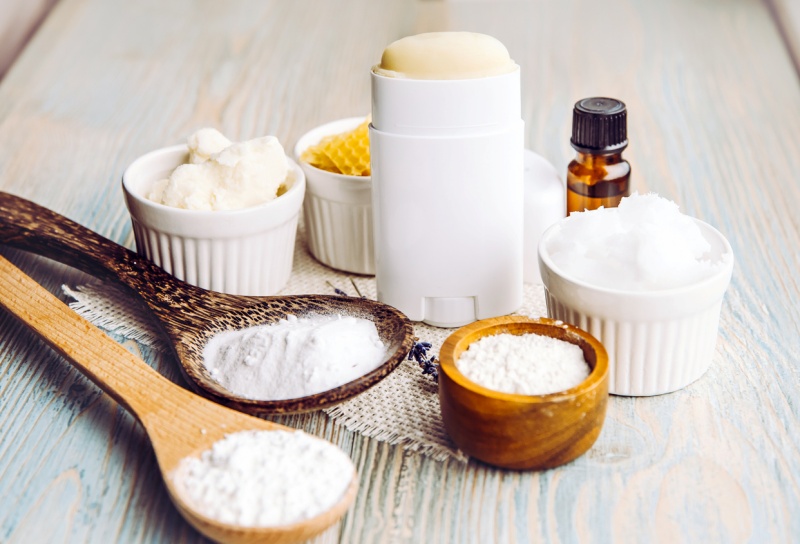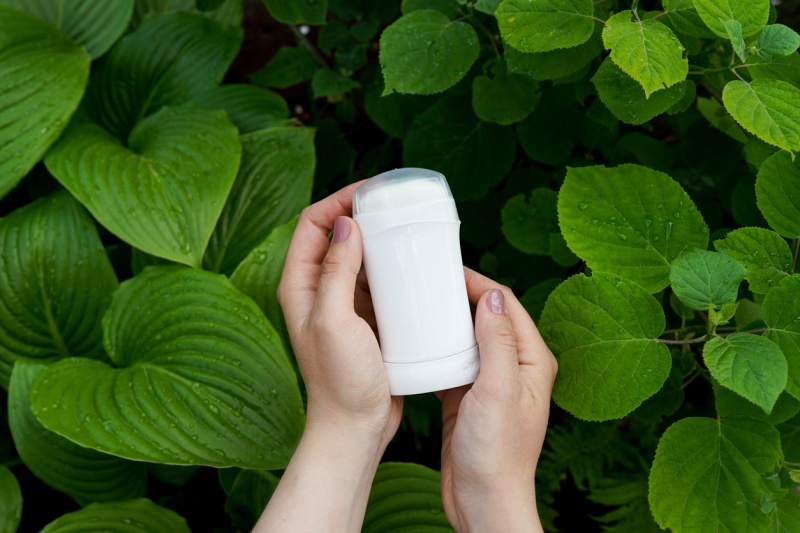Conventional deodorants are full of chemicals like parabens, formaldehyde, triclosan, and aluminium, which pose significant environmental concerns. From the environmental impact of aluminium mining to the pollution caused by paraben runoff into water bodies, these ingredients raise serious ecological issues.
Given these considerations, exploring natural deodorant alternatives could be a worthwhile endeavour.
Antiperspirant vs Deodorant: What’s the Difference?
Antiperspirants are designed to completely block the release of sweat. These products aim to reduce or eliminate sweating by blocking the sweat ducts in the underarms. They typically contain aluminium-based compounds that form a temporary plug in the sweat glands.
This plug reduces the flow of sweat to the skin’s surface, thereby minimising wetness. By preventing sweat from reaching the skin’s surface, antiperspirants indirectly help control body odour since odour-causing bacteria thrive in moist environments. However, antiperspirants do not directly combat the odour itself.
Traditional deodorants, on the other hand, primarily focus on masking the odour resulting from sweating. Traditional deodorants do not inhibit sweating; instead, they focus on masking or neutralising the odour produced by sweat. They often contain fragrances and antimicrobial agents that aim to eliminate or cover up unpleasant odours. While they may provide a fresh scent and help control odour temporarily, they do not reduce the amount of sweat your body produces.
Why Choose Natural Over Antiperspirant Deodorant?
Traditional deodorants often contain many chemicals and synthetic ingredients, including hormone disruptors, aluminium compounds, parabens, phthalates, artificial fragrances, and various preservatives. It’s worth noting that our skin is our body’s largest organ and anything applied to the skin can be absorbed into our bodies.
In contrast, natural deodorants offer an alternative that avoids these potential irritants and harmful chemicals. They typically replace these ingredients with natural and skin-friendly components.
Harmful Ingredients Found in Traditional Deodorant
Certain ingredients commonly found in conventional deodorants have raised concerns due to their potential health effects. Here are some of these ingredients and their associated risks:
- Aluminium: Aluminium compounds are used in many antiperspirants to block sweat glands and reduce sweating. However, aluminium exposure has been linked to health concerns, including a potential association with Alzheimer’s disease. Additionally, it has been suggested that aluminium may contribute to the accumulation of estrogen in the body, which could be correlated with an increased risk of breast and prostate cancer.
- Parabens: Parabens are preservatives commonly used in deodorants to extend their shelf life. These chemicals can mimic estrogen in the body, leading to hormonal disruptions. Such disruptions have been linked to various health issues, including potential associations with breast and prostate cancers.
- Phthalates: Phthalates are chemicals used to enhance the flexibility of certain ingredients and are also employed as fragrance components in products with artificial scents. These compounds can affect the endocrine system, potentially leading to early-onset puberty and an increased risk of breast cancer later in life.
- Triclosan: Triclosan is an antibacterial chemical that can disrupt the hormone system. It has been associated with an increased risk of breast cancer. It’s important to note that the FDA banned triclosan in hand soaps, but it is still allowed in deodorants.
Given the potential risks associated with these ingredients, many individuals opt for natural or aluminium-free deodorant alternatives to reduce their exposure to these chemicals and minimise potential health concerns. Natural deodorants often rely on safer and more skin-friendly ingredients to provide odour protection without the use of potentially harmful chemicals.
11 Best Natural Deodorant Ingredients

1. Baking Soda
Baking soda is alkaline, which counteracts the bacteria-loving acids in sweat and acts as a natural balancing agent for armpit odour.
2. Kawakawa
In Tae Reo, New Zealand’s indigenous language, “Kawakawa” derives its name from the word ‘kawa,’ which means bitter, reflecting the leaves’ bitter taste. Also known as the NZ Pepper Tree, Kawakawa held significant importance in Rongoā, the traditional Māori medicine. Māori traditionally applied it externally for treating cuts, wounds, and bruises. Additionally, it was used to alleviate toothache, soothe nettle stings, and address eczema, owing to its natural antibacterial and anti-inflammatory characteristics. These same properties continue to make it a valuable ingredient in various applications today.
This native New Zealand plant is known for its soothing and healing properties, making it ideal for addressing skin irritation and inflammation.
3. Aloe Vera
Aloe vera offers hydration and can calm irritated skin, promoting comfort in the underarm area.
Aloe Vera is an evergreen perennial plant that originally hails from the Arabian Peninsula. It is found growing in the wild in tropical regions across the globe and is cultivated for various agricultural and medicinal purposes.
4. Arrowroot Powder/Flour
Arrowroot powder helps absorb moisture, keeping underarms dry and reducing the conditions suitable for bacterial growth.
5. Unrefined Coconut Oil
Coconut oil not only provides a smooth consistency but also has antimicrobial properties that can help combat odour.
This remarkable oil contains fatty acids, including lauric acid, renowned for their antibacterial advantages. Coconut oil ensures a refreshing and clean scent by reducing the presence of odour-causing bacteria in the armpits.
6. Unrefined Shea Butter
Shea butter offers nourishment to the skin while contributing moisture to the deodorant’s texture and feel.
It is exceptionally antibacterial and non-comedogenic, meaning it will not clog the pores.
7. Mānuka Oil
Mānuka oil’s antibacterial properties are effective against odour-causing bacteria even at low concentrations. Its ability to inhibit bacterial growth helps in neutralising unpleasant odours, keeping underarms feeling fresh throughout the day.
It also has anti-inflammatory properties, which can benefit individuals with sensitive skin. It helps to soothe irritation and inflammation, making it suitable for daily use even on delicate skin.
Read more about mānuka oil as a natural deodorant for body odour here.
8. Frankincense Essential Oil
Frankincense oil stands out as a compelling ingredient in natural deodorants, offering a blend of aromatic and therapeutic properties. Its inclusion in natural deodorant formulations adds depth to the sensory experience, masking odours without relying on synthetic perfumes or harsh chemicals, thanks to its rich woody scent.
Its anti-inflammatory properties help alleviate skin irritation and redness, making it particularly suitable for sensitive underarm areas when applied topically.
9. Bay Leaf Essential Oil
Extracted from the leaves of the bay laurel tree, bay leaf essential oil offers a unique and pleasant fragrance, characterised by a warm, spicy aroma with hints of herbal notes. This aromatic profile lends itself well to natural deodorants, where it can serve as a natural alternative to synthetic fragrances, imparting a subtle yet invigorating scent.
Additionally, bay leaf oil is believed to possess antimicrobial properties, which may help inhibit the growth of odour-causing bacteria on the skin.
10. Clove Essential Oil
Clove essential oil, derived from the dried flower buds of the Syzygium aromaticum tree, is a potent and versatile ingredient in natural deodorants. Known for its rich, distinct, spicy scent and antimicrobial, antibacterial and antifungal properties, clove oil adds fragrance and helps combat the growth of odour-causing bacteria on the skin.
11. Tea Tree Essential Oil
Tea tree oil offers comparable antibacterial properties to those found in many alcohol-based deodorants but in a pure, natural form. The antibacterial properties of tea tree oil help manage underarm odours associated with perspiration.
Tea tree oil is potent and may cause irritation if not adequately diluted. However, when properly diluted, it is gentle with minimal to no side effects. Additionally, tea tree oil possesses anti-inflammatory properties, aiding in soothing and healing the skin. As a result, it is unlikely to cause skin irritation when used as a deodorant ingredient.

